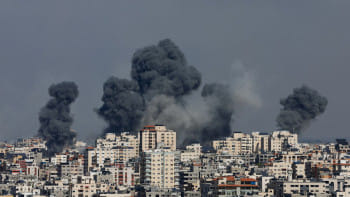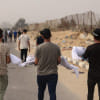What will follow Hamas’ war?

The multi-pronged operation that Hamas launched against Israel one day after the anniversary of the 1973 Yom Kippur War is eerily similar to that conflict. Daring and unexpected, both attacks caught Israel by surprise and dealt lethal blows to the country's sense of invincibility. It remains to be seen if, as in 1973, the Hamas attack will lead to a tectonic shift in Israeli politics and the country's relationship with the Palestinians.
In 1973, Egypt and Syria surprised Israel, penetrating deep into its territory. In the conflict's early days, the situation was so dire that Defence Minister Moshe Dayan recommended employing nuclear weapons. The Agranat commission, which was later tasked with investigating the war, coined the term conceptziyya to capture the intelligence services' hubris. Israeli military intelligence held the conceptziyya that the country's overwhelming firepower would deter the Arabs from attacking. Specifically, it was believed that Egypt would refrain from striking until it possessed sufficient air power to hit targets deep within Israel and silence its air force.
Today, these organisations have clung to a conceptziyya that Israel's overwhelming power would deter Hamas from initiating a new war. Their political masters, led by Prime Minister Benjamin Netanyahu, concluded that periodic Palestinian eruptions of violence were a manageable nuisance while imagining the occupied would accept endless occupation. The Hamas operation demonstrates the fallaciousness of that approach.
After the Agranat commission released its initial findings in 1974, Prime Minister Golda Meir and Dayan resigned. Meir bowed out graciously while Dayan rebuffed calls to do so because the commission had not recommended it.
Netanyahu is sure to mimic Dayan's attitude, but he now undoubtedly faces an ignominious denouement to his 40-year political career. While Netanyahu's harsh and unbending rhetoric won him supporters at home and abroad, it never matched reality, and the Hamas operation's occurrence on his watch has instantly turned him into a paper tiger. He promised his policies would subdue the Palestinians, only to see Hamas unleash the worst attack in Israel's history. He vowed that economic packages would placate the Palestinians, only to find their attachment to their land stronger than any appeal to their purse. His strategy never extended beyond allowing the military a free hand in the Palestinian territories.
Netanyahu proved that long ago. In his first 11 years in power, he bristled at the pressure Democratic administrations in the United States applied and claimed that the conflict could be resolved under the tutelage of a Republican president. But during Donald Trump's administration, Netanyahu pocketed American concessions, such as the relocation of the US embassy to Jerusalem, without offering the Palestinians any tangible benefits.
While Netanyahu's harsh and unbending rhetoric won him supporters at home and abroad, it never matched reality, and the Hamas operation's occurrence on his watch has instantly turned him into a paper tiger. He promised his policies would subdue the Palestinians, only to see Hamas unleash the worst attack in Israel's history. He vowed that economic packages would placate the Palestinians, only to find their attachment to their land stronger than any appeal to their purse. His strategy never extended beyond allowing the military a free hand in the Palestinian territories.
While Netanyahu's defenestration will be a slow burn, that of his subordinates will ensue in the weeks following a lull in the violence. The Agranat commission recommended the termination of only a handful of officers, mostly in the intelligence branch. The soul-searching brought about by this war will extend deeper into the army and spread to include the senior echelons of the internal security service.
Hamas may find itself facing a similar reckoning. Israel's security establishment often speaks of destroying "the terrorist infrastructure." The attack will provide it the opportunity to do so.
A large-scale Israeli ground invasion is certain, and a long-term occupation likely. Though Hamas leaders will relocate to underground bunkers, it is doubtful they will find secure shelter.
Hamas and other Islamist organisations situate themselves within the framework of Muslim history. But a gaze towards the New World is more fitting. In 1996, the Peruvian Túpac Amaru Revolutionary Movement took hundreds of hostages at the Japanese ambassador's residence in Lima. The spectacular attack captured the world's attention. A subsequent military raid freed the hostages while dealing the organisation a death blow from which it never recovered.
The international community will give Israel a wide berth to do the same to Hamas. The usual outcry of concern for civilian casualties will be muted, just as it was during Israel's 2006 war with Hezbollah. But Western governments can be most effective by using their clout to pressure Qatar and Turkey to expel Hamas officials, close their offices, and ban fundraising.
Whether the attack will close a chapter in Israeli history is the most important question. Ultimately, the 1973 war, together with the revelation in 1977 that Meir's successor's wife held an illegal foreign bank account, broke Labor's 29-year grip on power.
Today, Israeli clarions are trumpeting vengeance. When they fall silent, introspection will follow.
But a revival of the Israeli left and a rejuvenation of the peace process are unlikely. Since the Palestinians rejected Israel's peace plan in 2000, the left has been in the doldrums. Today, Labor has plummeted from the peak of power to one of the smallest factions in the Israeli Knesset.
In 1973, the realisation that Israel was not impregnable put the country on the road to peace with Egypt. The greatest tragedy of the current war will be the inability to do the same with the Palestinians.
Barak Barfi is a former research fellow at New America and a former visiting fellow at the Brookings Institution.
Copyright: Project Syndicate, 2023
www.project-syndicate.org
Follow The Daily Star Opinion on Facebook for the latest opinions, commentaries and analyses by experts and professionals. To contribute your article or letter to The Daily Star Opinion, see our guidelines for submission.

 For all latest news, follow The Daily Star's Google News channel.
For all latest news, follow The Daily Star's Google News channel. 










Comments